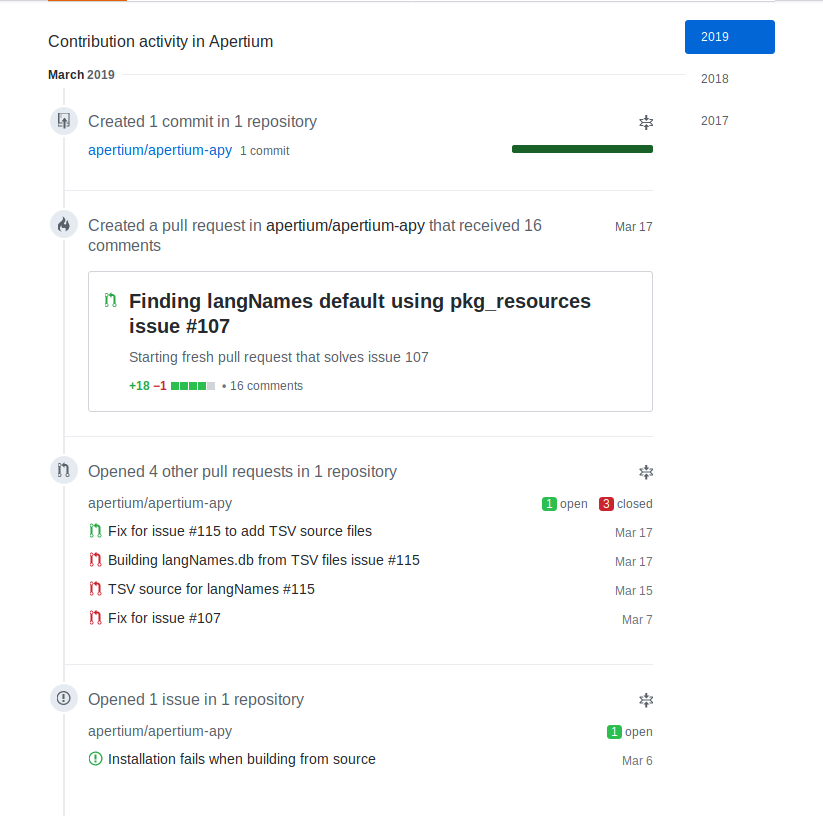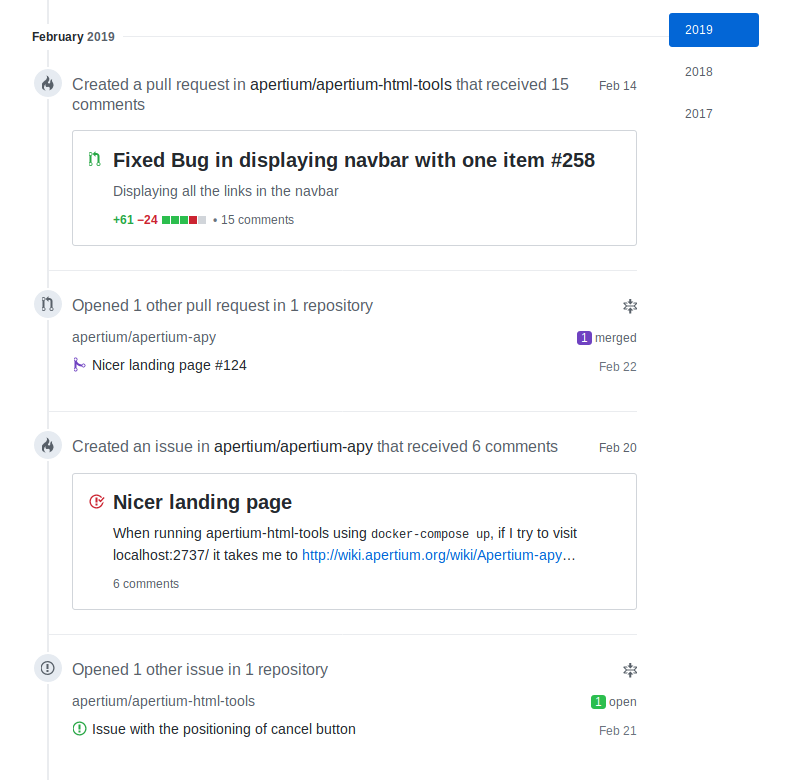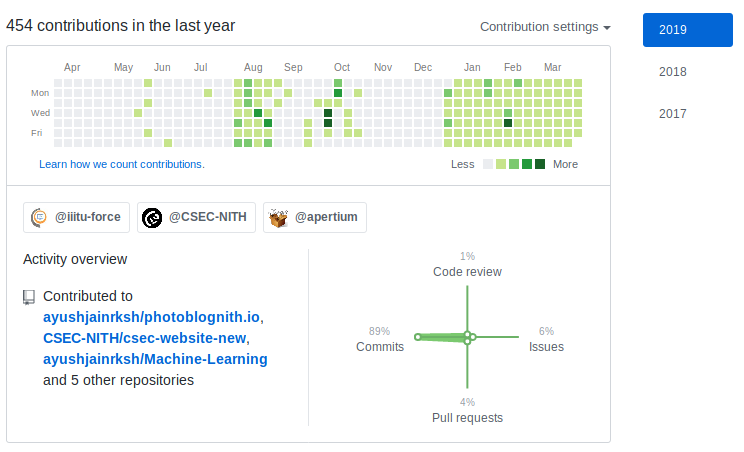User:Ayushjain/proposal2020
Contents
- 1 Apertium GSoC 2020 Improvements to Apertium Website
- 2 Contact Information
- 3 Why is it that you are interested in Apertium?
- 4 Which of the published tasks are you interested in? What do you plan to do?
- 5 Why Google and Apertium should sponsor it?
- 6 How and who it will benefit in society?
- 7 Work Plan
- 8 Contribution to Apertium
- 9 Education
- 10 Experience
- 11 Non-summer of code plans
- 12 Links
Apertium GSoC 2020
Improvements to Apertium Website [edit]
Contact Information[edit]
Name: Ayush Jain
E-mail address: ayushjainrksh@gmail.com
Alternate email: 17152@iiitu.ac.in
Mobile Number: +91 9045511472 (India)
IRC nick: ayushjain
Github: ayushjainrksh
Timezone: UTC +5.30
Why is it that you are interested in Apertium?[edit]
I belong to India, a country with 22 different spoken languages and 720 dialects used by a population of 1.3 billion. Being from a nation with vast languages and a student of Computer Science, I strive to solve the problems in language translation through my knowledge of programming and natural language processing. I like the concept of Apertium as an open source language translator as it solves the problem of language translation with ease. As I am a student of Computer Science, I have a keen interest in programming and development. I am proficient in web development and want to apply my knowledge of machine translation by contributing in Apertium. I have an urge to improve open source language translation with Apertium.
Which of the published tasks are you interested in? What do you plan to do?[edit]
I am planning to work on the Improvements to the Apertium website Idea. As I am skilled in web development and have appropriate experience working on it, I decided to work on improving Apertium website by contributing to its API called APy and also improve the frontend of the website for better user experience along with addition of new functionalities.
Why Google and Apertium should sponsor it?[edit]
I have a proper knowledge and experience with development in Python, C++ and JavaScript. Moreover I worked on several projects including areas like web development, OpenCV, machine learning and natural language processing. The Google and Apertium sponsorship would motivate me to work on my GSoC project during summer. I want to add certain functionalities to the Apertium website such as dictionary lookups. Getting sponsored by Google and Apertium would help me focus on the project during summers.
How and who it will benefit in society?[edit]
Adding certain capabilities of Apertium such as dictionary/synonym lookup and webpage translation to the website would increase the functionalities in the Apertium website. This would help in increasing the user base of Apertium and provide an improved language translator to the users.
Work Plan[edit]
Broad division[edit]
| PHASES | OBJECTIVES | TIME |
|---|---|---|
| Community Bonding Period | Getting to know all the mentors and getting acquainted with complete documentation of apertium. Acknowledge the problem statement and start working on a possible solution with focus on each detail. | 4 May - 1 June |
| Phase 1 | Working on adding dictionary/synonym lookup for single-word translations to the website. | 1 June - 3 July |
| Phase 2 | Working on improvements to apertium website by adding reliability coloring to the synonyms. | 3 July - 31 July |
| Phase 3 | Improvement to language detection and wrapping up the project with proper documentation and project report. | 31 July - 31 August |
Detailed plan[edit]
| WEEK(PERIOD) | BRIEF GOAL | DESCRIPTION | DELIVERABLE |
|---|---|---|---|
| 4 May - 1 June | Community Bonding Period |
|
Report for next week’s work plan. |
| 1 June - 8 June | Week 1: Setting database for dictionary lookup |
|
A database with the word pairs and probabilities |
| 8 June - 15 June | Week 2: Adding dictionary lookup in python |
|
Working back-end for dictionary lookup. |
| 15 June - 22 June | Week 3: Creating dictionary lookup front-end |
|
A user-focused front-end for the dictionary lookup |
| 22 June - 29 June | Week 4:Completing the dictionary lookup functionality |
|
Dictionary lookup feature added to the website. |
| 29 June - 3 July | First Evaluation |
|
Bug reports |
| 3 July - 10 July | Week 5: Reliability Coloring back-end |
|
Ranking the synonyms according to the reliability. |
| 10 July - 17 July | Week 6: Completing the reliability coloring back-end |
|
Coloring the synonyms according to the reliability. |
| 17 July - 24 July | Week 7: Front-end for reliability coloring. |
|
Better UI when using single word translations. |
| 24 July - 31 July | Week 8: Updating the website |
|
Implemented reliability coloring of the synonyms in the website. |
| 31 July - 7 August | Week 9: Improving language detection |
|
Report on issues in language detection |
| 7 August - 14 August | Week 10: Adding "did you mean?" function. |
|
Did you mean functionality implementation. |
| 14 August - 21 August | Week 11: Apertium website finalizing |
|
Did you mean functionality added to website. |
| 21 August - 28 August | Week 12: Releasing updated Apertium website |
|
Release Apertium website for users. |
| 28 August - 31 August | Week 13: Wrapping up |
|
Release final production. |
Contribution to Apertium[edit]
I have been contributing to Apertium for quite a while now.
Here is a list of my contributions various Apertium contributions :
- Issues :
- apertium-html-tools = 1
- apertium-apy = 2
- Merges :
- Apertium-apy = 2
- Pull requests :
- apertium-html-tools = 1 open.
- Apertium-apy = 1 open
I have been working on the issues in html-tools and apertium-apy under the guidance of my mentor.
Two of my pull request have been merged in which I have :
Added an index page for localhost:2737 in apertium-apy along with unit test written in tornado.
Created source TSV files for the SQL database(with over 20000 lines of code) that convert at build time.
I am working on 2 other pull requests which are still open and involves complex issues. It includes :
- Finding langNames.db using pkg_resources.
- A responsive navbar with additional apertium features.
Here you can see my github timeline for contributions in Apertium :


Education[edit]
I am a third year student pursuing B.Tech. with majors in Computer Science and Engineering from Indian Institute of Information Technology, Una. I got my first exposure to computers at an age of 8 and since then I have been attached to them. Not only did I perform very well academically in the field of Computer Science but also choose Computer Science for higher education.
Experience[edit]
I have been studying Computer Science for 7 years now, with working experience in core programming languages such as Java, C++, Python, Javascript. I have been a part of several hackathons at college level. I am proficient in competitive programming and algorithm development. I have worked on several projects and build several professional websites many of which can be found on Github. I have been contributing to open source for quite a while now and have worked on several machine learning models in Python and R. I have also worked as Google Code-in mentor for Apertium this year. Here is my github timeline :

Non-summer of code plans[edit]
Google Summer of Code lies during the summer vacations of the college. I will be able to devote 40 hours per week and more if necessary to Apertium during summer of code. I might have a small vacation plan but that lies in between the Community bonding period and I will be able to manage my work accordingly. I also acknowledge that GSOC is my foremost priority and I won’t be working on any other internship, training or classes if selected for GSOC.
Links[edit]
Linkedin : View Profile
Github : View Contributions
CV : View CV